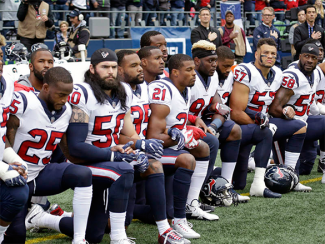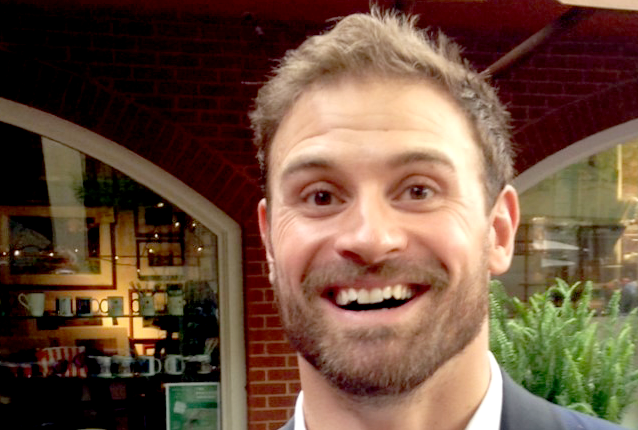BONUS POINTS
Football players score big in battle with team owners

Houston Texans ‘take a knee’ to protest owner’s disrespect
BOSSES ZERO. WORKERS THREE. That’s not how the running battle between players in the National Football League (NFL) and team owners gets reported—but that’s more like the truth of it.
It all began in 2016 when San Fransisco 49ers quarterback Colin Kaepernick refused to stand for the American national anthem during the ceremonies before games. He said it was to protest police killings of African American men and widespread racial injustice in the USA.
He didn’t say anything about looking to strengthen player solidarity—but it happened anyway. The more team owners tried to clamp down on player behaviour the more the players discovered their own power.
Owners at first rejected the iron fist approach. They agreed the players had a constitutional right to speak out. Their concern, they said, was that the way the players were exercising that right was not “appropriate.” They assured the players they were all on the same side. Then the truth came out.
The truth comes out
In late October Bob McNair, owner of the Houston Texans told reporters that catering to the concerns of players was like “letting inmates run the prison.” That did it.
There were reports that the entire Texan team considered an immediate full-scale walkout from practice. They also discussed the removal of the team decals before their next game. Even the previously unthinkable idea of a boycott—forfeiting the game—was in the air.
Ultimately the whole team did what the boss didn’t want: they all knelt as the national anthem was played to start their next game.
McNair did apologize for what he said. But apologies carefully crafted for public consumption were never going to fix things. More was at stake than hurt feelings between members of the “NFL family.”
This is about what professor Lou Moore calls a “black labor movement.” That is: the assertion of the economic power of black workers to reclaim their humanity in response to those who would deny it.
Three big wins
McNair’s outburst proved players could no longer believe they had anything in common with the owners. They were ready to support the hard line their leaders were already taking with all the owners. It paid off with three big wins:
- no rules forcing players to stand for the national anthem
- formal NFL support for new laws to cover sentencing for criminal convictions
- NFL financial support of player social-justice work.
The decision of the owners not to force players to line up, helmet in hand, for the playing of the national anthem was a double victory: it affirmed the power of their collective bargaining agreement and their right to unrestricted free speech.
Player solidarity had forced NFL owners to admit that Trump’s call to “force players to stand for the anthem” would cause a full-scale rebellion.
Another win for the players was support for social justice issues beyond the Kaepernick protest. The league commissioner joined Seattle Seahawk Doug Baldwin in sending a letter on NFL stationery to the US congress in support of a bill to reduce minimum sentences for nonviolent drug offenders.
The letter expressed a desire of the players to ensure that: “every American has equal rights and equal protection under the law.”

The NFL also promised what Doug Baldwin called “significant” financial support for the players’ extensive social-justice work and efforts. One shining example of such an effort comes from Chris Long. The Philadelphia Eagle defensive end has pledged his entire $1M salary for the year to fund scholarships for underprivileged youth in Charlottesville, St. Louis, Boston, and Philadelphia.
As a bonus, the protests also spurred players in other professional sports to take action. Michael Bennett of the Seahawks, basketball players Maya Moore and Diana Taurasi, soccer star Megan Rapinoe, former NBA player Baron Davis, and others have launched Athletes for Impact, a new organization to aid athletes in political and community endeavors.











Add new comment